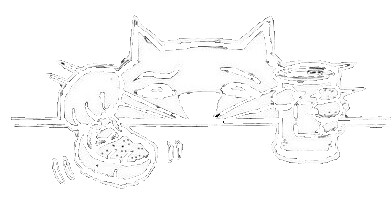Charles Latham & the Borrowed Band
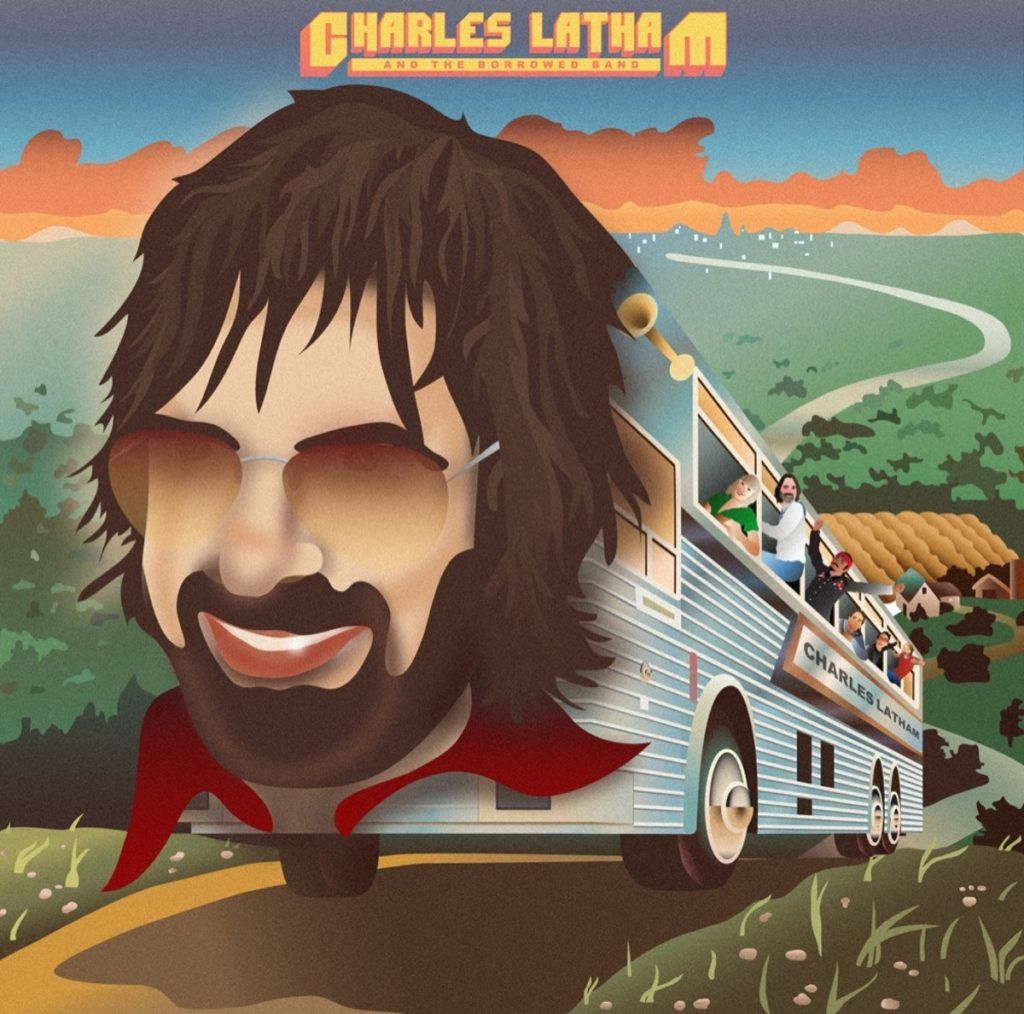
“Latham’s music is passionate with biting wit.” –NPR”Reminiscent of the glorious sloppiness of Neil Young & Crazy Horse.” – Folk Radio UK “One of the sharpest songwriters to emerge of late on the antifolk sphere…Charles Latham could be your new hero.” – INDY WeeklyCharles Latham wields an acid tongue and a poison pen, crafting social criticism, tragicomic narratives, and brutal self-analysis into ramshackle country-rock songs. After a decade of wandering, from Philadelphia to Nashville to Memphis to the U.K., singer-songwriter Charles Latham returned to North Carolina in late 2014, laying roots down in Durham. His 2017 LP, “Little Me Time”, found Latham combining his acerbic wit and quirky songwriting with more polished production values and an expansive sound. In order to bring the songs to life for live audiences, he recruited an ensemble of local talent, now known as The Borrowed Band. Since then, the Borrowed Band’s fluid line-up has solidified into a core group of musicians, forged into a spectacularly energetic and dynamic live band through the alchemy of constant gigging: drummer “Steamboat” Steve Anderson (Kamara Thomas) and bassist Billie Feather (Hank, Pattie & the Current) providing the foundation from which lead guitarist Luis Rodriguez (6 String Drag) and Gordon Hartin’s (Shooter Jennings) pedal steel launch their fireworks. On vocals and rhythm guitar, Latham is joined by Abby Sheriff, creating a vocal blend that recalls Gram Parsons and Emmylou Harris. Charles Latham and the Borrowed Band’s 2020 self-titled LP is a celebration of the new sound they have forged together, which marries Latham’s idiosyncratic songwriting style with vintage, psychedelic country-rock. Links: Website | Instagram | Twitter | Facebook | Spotify
Pretty Sick

‘Makes Me Sick, Makes Me Smile,’ the new album by Pretty Sick, sees London-by-way-of-New York Sabrina Fuentes juxtapose a life between two cities where destiny is shaped by the force of our own hands. A fully-realized, visceral experience that’s both blunt, bleak and stubbornly romantic, it weaves together the heady visions of prior EPs ‘Come Down’ and ‘Deep Divine’ into an uncompromising portrait that’s point-blank and personal.Fuentes penned lyrics between New York and London, and the album maps out the fault lines within each city. “I’d rather die than let you go / and you’ll die before you let me,” she sings in the opening chorus of the anthemic “Yeah You,” one of the many times ‘Makes Me Sick, Makes Me Smile’ contemplates the complex ties of finding a home within a scene, which Fuentes explains “is a breakup letter” to the city. Fuentes grew up in Manhattan, and assumed she’d carry on working after various fashion internships at VFILES and Helmut Lang, until she had a life-changing conversation at a dinner party where an acquaintance pulled her aside and was adamant she get out.Now recently graduated from Goldsmiths in London, where she met and was living in a house with guitarist Orazio Argentero (who also plays in South London experimental outfit Paddywak), ‘Makes Me Sick, Makes Me Smile’ feels washed in the low-lit, reflective glare of both cities, a documentation of the all-consuming nature of living in a place that demands all of you. Pretty Sick itself, which has been helmed by Fuentes since her early teens, showcases that determination: the continued evolution of the band is itself a roadmap of relationships steeped in collective experience, anchored by Fuentes singular vision. Original drummer Ava Kaufman returns for the new record, which was produced by Paul Kolderie (Pixies, Radiohead, Hole), and each new collaboration feels like a tangible hallmark of continual resurrection.Across the 12 tracks, Fuentes grapples with her claustrophobic surroundings, and the idea that the environment you exist in can be a matter of life or death. Chock full of flashbacks to anxiety and the warped sense of realism that comes from teetering on the precipice, Fuentes recalls toxic relationships, power imbalances and a myriad of dangerous situations that “still keep me up at night.” It’s impossible to completely sever ties: slow-burn “Lilith” was penned about a friend who passed away, and when she sings “if we go out we’ll go side by side” it’s another haunting rumination of the blood bonds that can tether groups of people to their own self destruction.“I’m someone who sees everything as very black and white,” Fuentes explains, and these concerns with duality run deep throughout the album. An attempt to find balance while oscillating between good and bad, Fuentes grounds the record in double meanings. The record opens with “yellow roses in Tompkins Square,” a deceptively serene image that also signifies flowers given from the unfaithful. Reality and fantasy run parallel with numbness and intensity, while all the while Fuentes yearns to “do something that matters.” What does it mean to make a difference? Her version of divine intervention manifests itself through her creative work: “I would not have any of the things I have right now if not for my unconditional love of music.”Links: Website | Instagram | Twitter | YouTube
Vansire
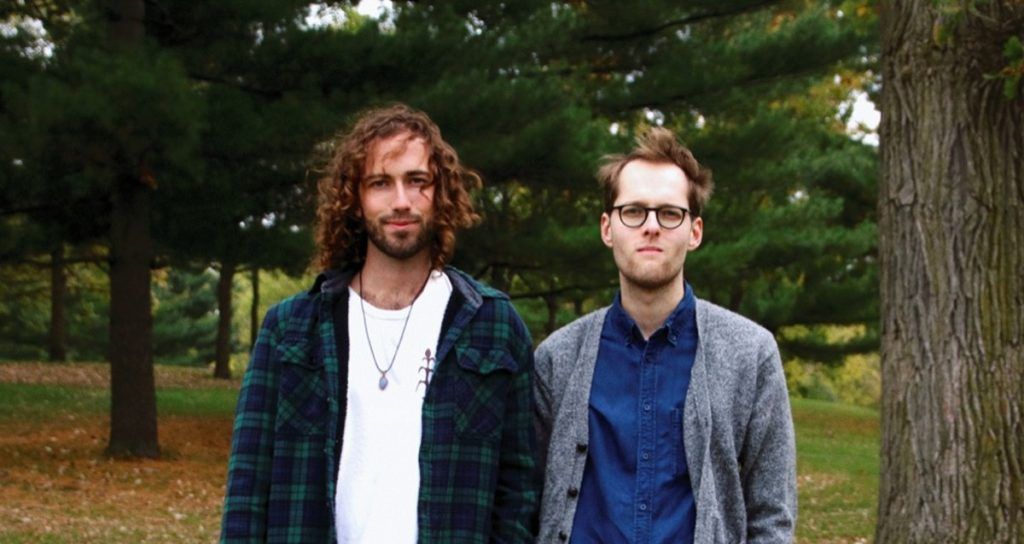
Vansire is the chillwave-inspired project of multi-instrumentalists Sam Winemiller and Josh Augustin. After meeting on their high school’s drumline they began making music in the summer of 2015. Since then, they have released three albums, two EPs, and one live album as well as a slew of singles in the late 2010s. Their music, inspired by the driftless region of Minnesota and travels across America, features dance-imbued earworms, vintage synthesizers, and ambient soundscapes. After working together remotely during their college years, they moved back to Minnesota and now record and produce all their music by themselves in Minneapolis, Minnesota.Links: Website | Bandcamp | Instagram | Twitter | Facebook | YouTube
Post Animal
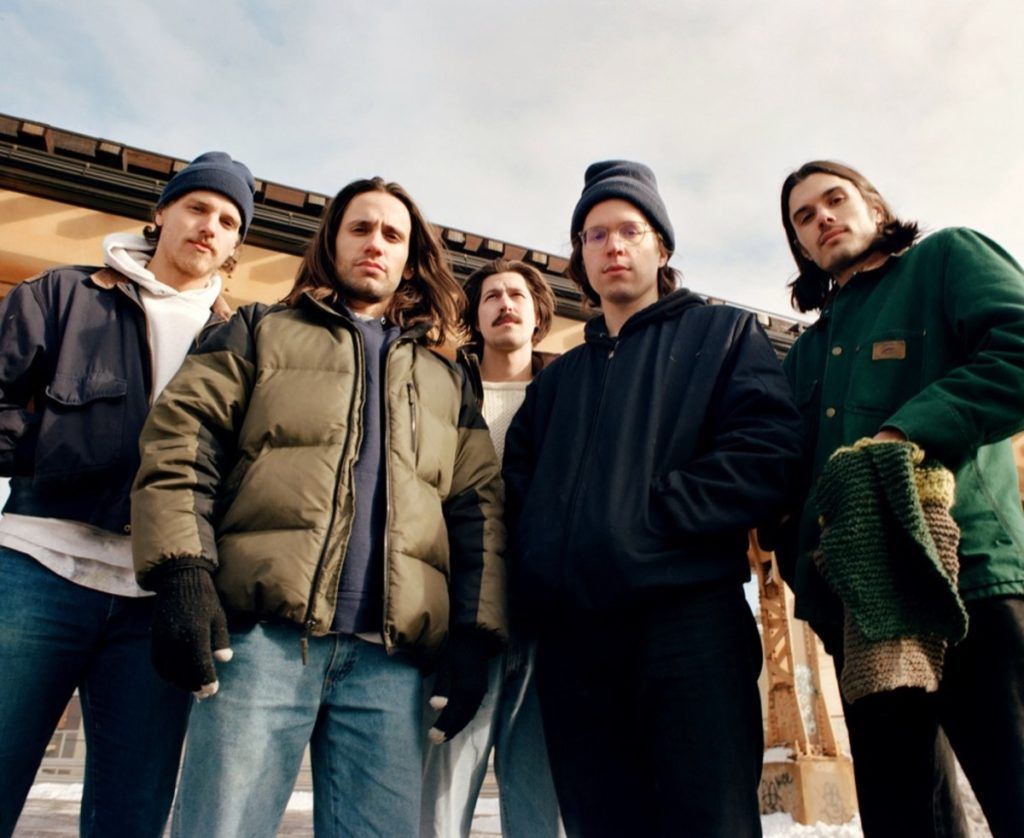
Links: Website | Facebook | Instagram | Twitter | YouTube | Spotify
Flasher
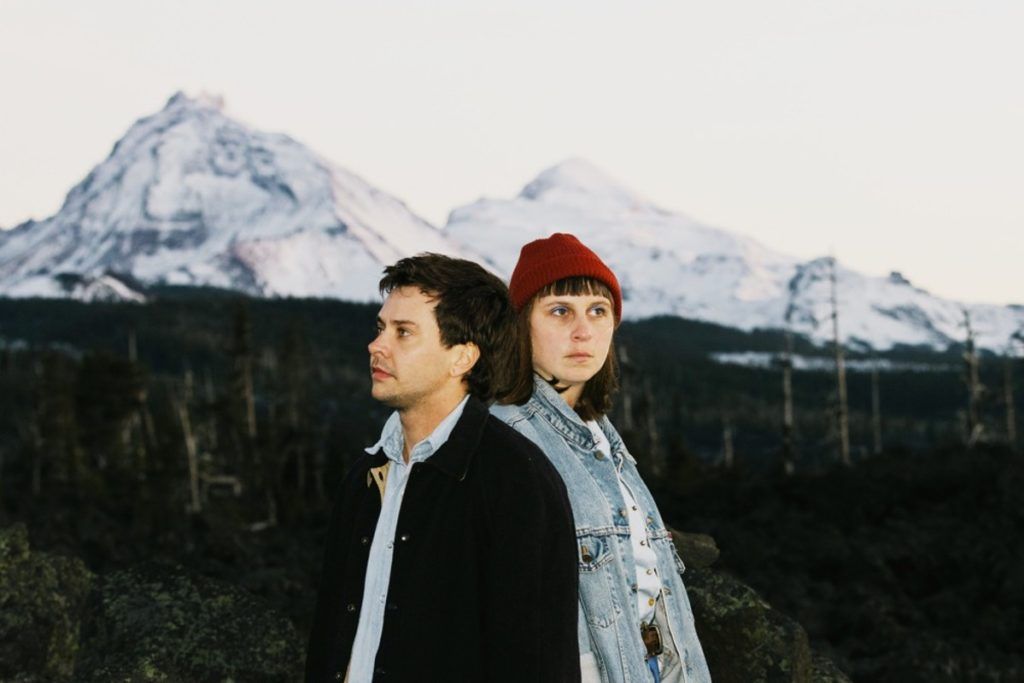
The band’s 2018 debut, Constant Image, was a triumph – a set of songs both dizzy and explosive, balancing new-wave lushness and post-punk frenzy. Love is Yours steps up the ambition and reaches for the horizon. The record is ablaze with mood, melody, and carefully threaded hooks, finding the band foregrounding the pop sensibilities that had always been present in their previous releases. It retains the attitude that was fundamental to the band’s DIY roots, but cuts loose a touch of the angst. Though the songs process disillusionment and loss, the music evokes warmth and optimism. It is their best record and also their most generous.The album was written and recorded amid a moment of flux for the band. Now a duo, guitarist Taylor Mulitz and drummer Emma Baker had to reimagine Flasher’s voice. They embraced uncertainty and allowed their roles to become unfixed. They wrote collaboratively and followed their intuition. Instruments were swapped, harmonies were layered over samples, and a space was created for Baker to step out from behind the drumkit into a front person, sharing vocals alongside Mulitz. On the other end Flasher emerged familiar, but also stronger and more singular.Formed in 2015, Flasher was born out of Washington, D.C.’s newly resurgent underground music scene. In that context, the trio stood out. They were urgent and wiry, but could also convey a cool and authentic tenderness. A year later, when the city was leaden with post-election gloom, Flasher could remind you – however fleetingly – that pleasure was still a possibility. They released an EP and a 7” single on Sister Polygon Records before joining Domino for Constant Image. The record was critically adored and ceaselessly toured. When the D.C. trio finally took a breath nearly two years later it was at an unmistakable high point. Flasher had hit the road alongside its heroes, scored spots on festival bills, and packed hometown shows.Not long after that, as the band prepared to hunker down and begin writing their follow up, D.C.’s tight-knit community began to splinter and realign. Bands broke up. People got older, became restless, and moved on. Flasher was not spared a shake-up. Bassist Daniel Saperstein parted ways with the group. Mulitz would eventually decide to relocate – first to Baltimore and then to Los Angeles, making the group bi-coastal.Working as a duo took a bit of recalibration. The songwriting process changed dramatically, but in a way that quickly began to feel energising. “Once we had this implosion, we let go of the pretence and confines that we had pigeonholed ourselves into,” says Mulitz. “Going into this record, the vision was pretty simple: We wanted to write songs that came intuitively. We were leaning into that while consciously creating a real space of trust and openness.”The bulk of Love is Yours was recorded in Washington, D.C. with long-time friend Owen Wuerker, who also helped flesh out the instrumentation by contributing additional bass, percussion, synths, and guitar. Rather than binding the duo to its past – to geography, old habits, or trusted sounds – the familiar environment proved liberating. Working out of Wuerker’s well appointed home-studio allowed inspiration to arrive off deadline. With no shows in sight, Flasher could relax on presenting as a “rock” band. Baker and Mulitz tweaked tempos, structures, and dynamics accordingly. They toyed with genre, melody, and texture.Links: Website | Bandcamp | Spotify
Electric Six, Supersuckers
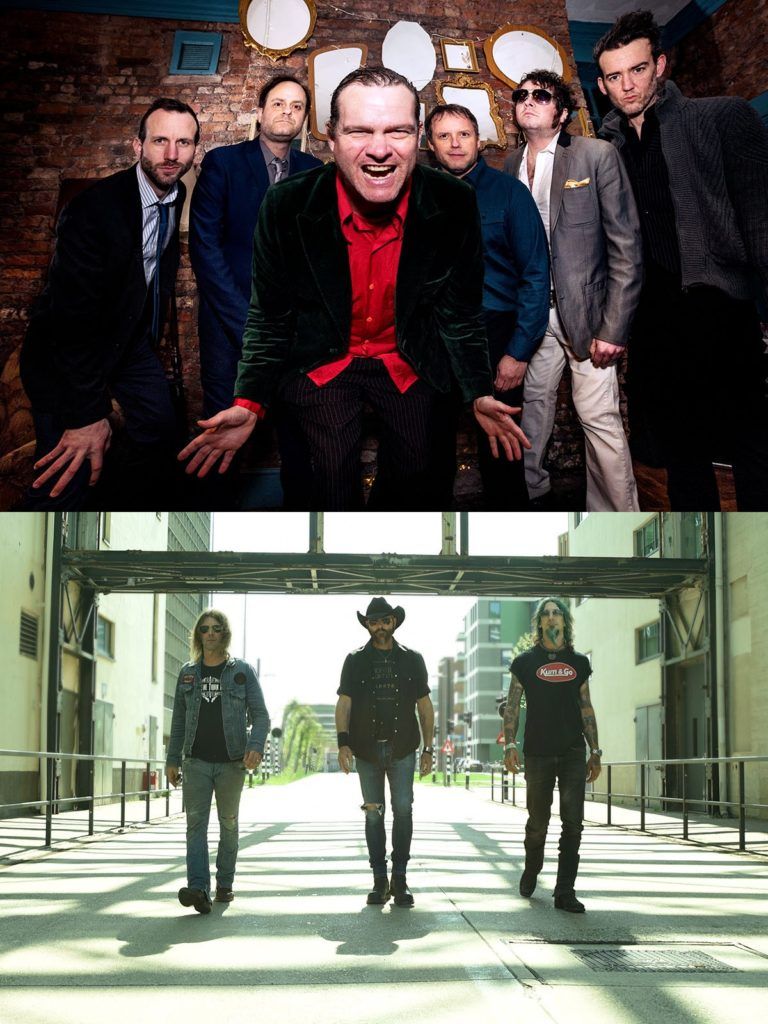
The Devil has always been there. He is the great outsider, the original iconoclast. He is a conniving little shit and never seems to tire of giving humanity a wedgie or a wet willie just for a laugh. The Devil is capable of taking many forms. He can exist as one being or spread out amongst many. He can present himself as an ordinary man or as a horrific cloven-hoofed beast depending on his mood. Above all else, The Devil lives to corrupt, to adulterate, to defile.Electric Six has often used The Devil as subject matter for its songs because of that last bit, the part about corruption and adulteration. That’s what Electric Six has been trying to do with its music now for quite some time!!!! We want to corrupt young women….just like The Devil!!! There’s nothing more rewarding than the seduction of a young innocent maiden, forcing her to wear demonic dresses, levitating her towards the great fiery skull and watching her eyes turn black as she gives into evil and becomes the bride of The Devil!!!! That….is why we started this band….to help women realize their potential as sexy evil maidens with eyes reflecting the utter darkness of a corrupted soul.With its fourteenth studio album Bride of the Devil, Electric Six examines the concepts of evil and corruption, humanity’s various falls from grace, the nine circles of purgatory and of course, the internet itself. Bride of the Devil opens with the thunderous opener “The Opener”, a bombastic celebration of the arena rock Electric Six never got to play. The next two numbers are textbook ear worm guitar pop numbers that deal with debilitating income inequality and nepotism (“Daddy’s Boy”) and the horrors of being forced into a pool of toxic waste by an a rabid Doberman trained to kill (“(It Gets) (A Little) Jumpy”).And then we get to the title track, a radio anthem, where it all becomes clear that The Devil is a metaphor for Russia and the United States is the young girl who is seduced, corrupted and wedded into a Satanic covenant with the beast. It’s all there in black and white. The Carrie Underwood-esque lyrics alongside a backdrop of vodka and caviar and backchannels and Seychllian bank accounts. That’s how they did it. They went after our country performers and got the rubes to feel good about being Russian assets. And still, it is the feel-good anthem of the summer.Finally, the haunting album closer “Worm In the Wood” is Electric Six at its most serious, most tender and emotional. Haunting. Effervescent. Corrupt. Jaundiced. Tired.So there you have it. Electric Six is back with its fourteenth record and it’s poppy and feel-good, as well as heavy, both sonically and lyrically. Our sound will corrupt you and enslave you as the beautiful demonic bride you know you truly are. Fraulein, take this severed hand with it’s creepy long nails from the beginning of time. To do so is truly thine destiny.Electric Six Links: Website | Instagram | Twitter | FacebookSupersuckers Links: Website | Instagram | Twitter | Facebook | YouTube
Daniel Nunnelee

Daniel Nunnelee is an alternative folk artist based out of Nashville, TN. Born in Memphis and raised in small towns around Mississippi and Tennessee, Daniel spent time in many different churches. It was a talented music minister in Senatobia, Mississippi that inspired Daniel to start playing and writing his own music. His songs are reflections of loud thoughts in quiet moments, a style mirrored in his performance.Links: Website | Instagram | Twitter | Spotify | YouTube
Tropical Fuck Storm
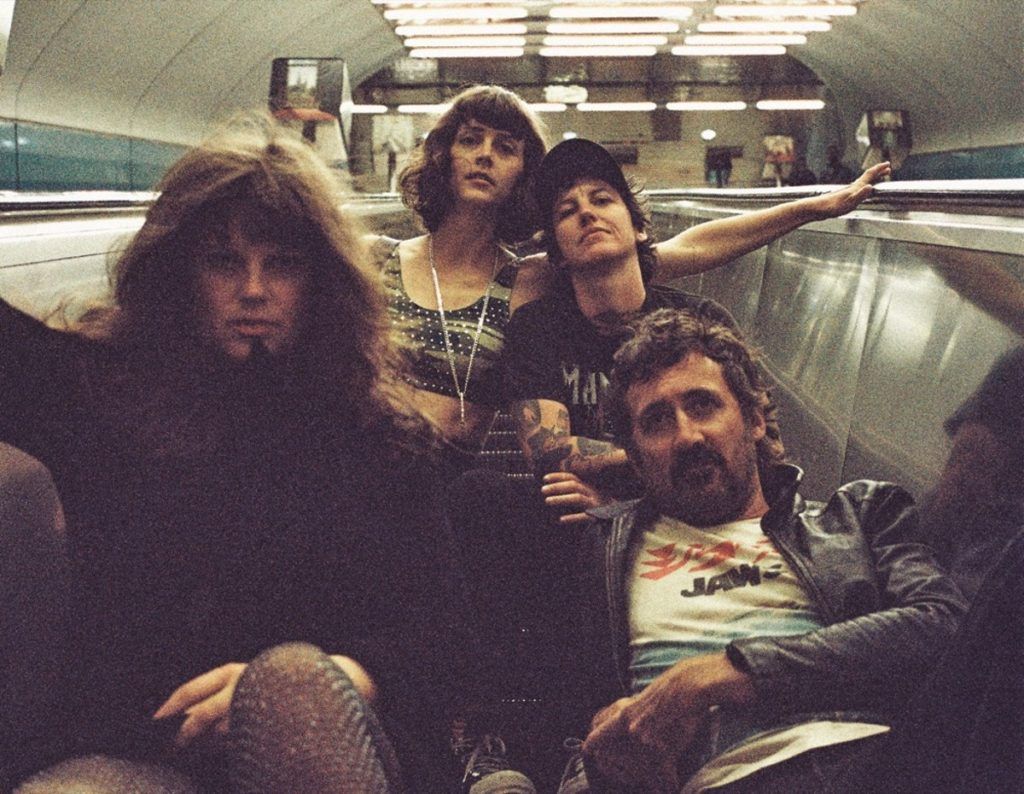
Australian post-apocalyptic acid punk disco scuzzheads TFS are coming to the US and Canada for the first time since 2019. For the last two years they’ve been holed up in a bush bunker pursuing their sonic experiments which have produced 2021’s Deep States album, and feature film Goody Goody Gumdrops. Tropical Fuck Storm members Gareth Liddiard, Fiona Kitschin Erica Dunn and Lauren Hammel will be bringing their wild, destructive and unstoppable chaos to the Northern Hemisphere stages performing songs from A Laughing Death In Meatspace (2018), Braindrops (2019) and Deep States (2021).“Everyone I could see, myself included, had a smile on their face I’m not even sure was voluntary. The looks on the faces of the crowd after the band had left the stage were ones of awe—multiple mouths were left agape and eyes were wide open, almost in disbelief. It was a remarkable performance. One that anyone in the audience would attest to it being phenomenal. Throughout the entirety of the set, down to how the band dealt with their technical issues, it felt like witnessing the best guitar band in the world” Spectrum Culture @ Elsewhere, Brooklyn“A Tropical Fuck Storm gig is like putting your brain in a blender for an hour straight” Beat Magazine“The darkly hallucinogenic world of Melbourne weirdos Tropical Fuck Storm is a borderless realm, its edges blurry like a fever dream. … Any time you think you’ve sussed their murkily psychedelic approach, the quartet take another thrilling, freewheeling detour.” Kerrang“In Tropical Fuck Storm’s determination to engage as fully as possible with the reality of human existence, in all its ugliness and contradictions, they are tapping into its truths.” The Quietus“Beyond such vivid, often thrilling caricatures, however, the acrid smoulder of The Donkey, the mysterious haunt of Legal Ghost and the nuanced pop of New Romeo Agent prove that Tropical Fuck Storm have yet to succumb to glib nihilism, and that tenderness and poetry are still within their grasp” Mojo“What makes Tropical Fuck Storm as vital as they are unsettling is how well their songs, which often seem chaotic, fractured, and as brutal as the subjects they consider, speak to the currents of our contemporary worry. They’re making a strange sort of musical magic, to be sure. But they’re also demanding that we confront a world where change isn’t necessarily gonna come.” New City MusicLinks: Website | Bandcamp | Instagram | Twitter | Facebook
Jon Shain & FJ Ventre, Shannon O’Connor’s CD Release of “Stay, My Darling!”
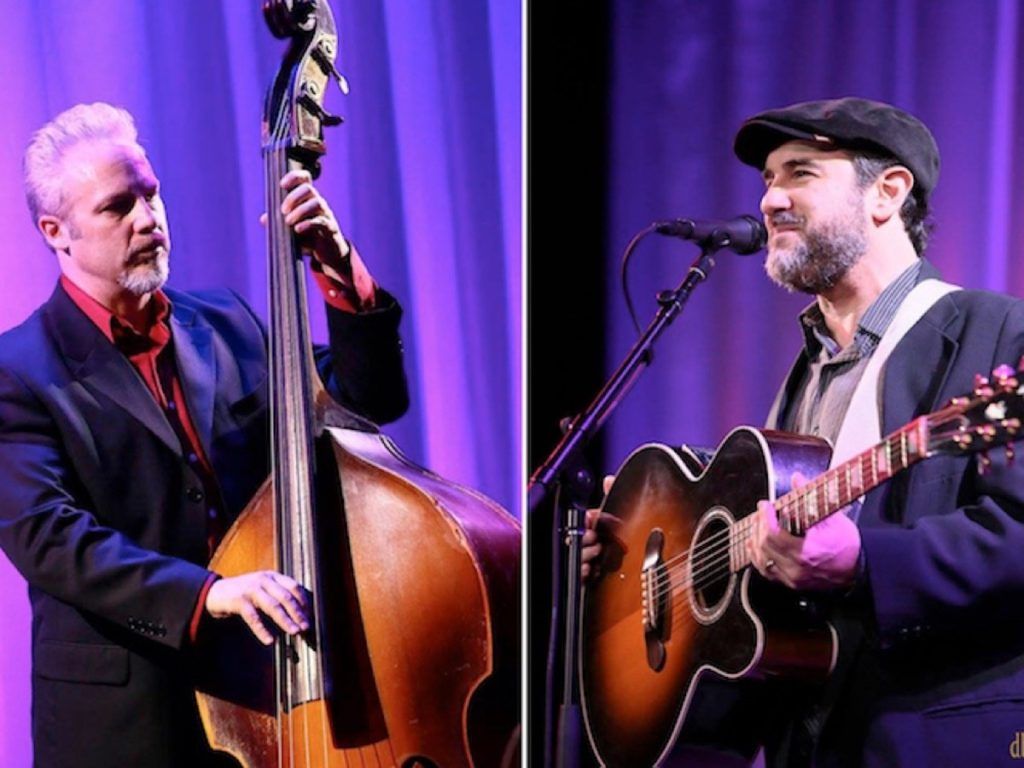
Jon Shain is a veteran singer-songwriter who’s been turning heads for years with his words and his fiery acoustic guitar work, and his evolved musical style – combining improvised piedmont blues with bluegrass, swing, and ragtime. Shain had the good fortune to learn directly from a number of North Carolina’s older blues players, and became a member of Big Boy Henry’s backing band. He is the 2019 winner of the International Blues Challenge in the solo/duo category. In addition, Shain was a finalist (along with FJ Ventre) in the 2009 International Blues Challenge, he won both the 2008 and 2018 Triangle Blues Society’s Blues Challenge and was the 2006 winner of NC’s Indy award for Best Folk Act. Shain’s most recent solo disc, Gettin’ Handy with the Blues: A Tribute to the Legacy of WC Handy, was released in January, 2018. Shain’s newest album, Never Found A Way to Tame the Blues, recorded along with long-time collaborator FJ Ventre was released in July.FJ Ventre and Jon began playing music together in 1982 when they met in high school. FJ went on to University of Massachusetts-Lowell, earning a B.A. in Music Performance and Sound Recording. He remained in the Boston area, performing in the city’s vibrant music scene. Since relocating to Chapel Hill, NC in 2000, Ventre has performed with his own group The Swang Brothers, as well as most of the Triangle’s roots acts. In addition to performing as a sought-after sideman, he spends his time behind the mixing board, engineering at his own Good Luck Studio. With Jon, they have become sought-after producers in the folk/Americana genre, producing several charting Folk and Blues albums in the last few years. https://jonshain.com/jon-shain-and-fj-ventre/ Shannon is a local singer/songwriter known for her playful, gritty, and brutally honest songwriting. She coined her style “Sultry Americana” at the turn of the century. She is known for her strong solo performances and is often called to open for national acts that come through town. Shannon independently released several records and was thrilled to work at Good Luck Studio to make this latest release, “Stay, My Darling!” Jon & FJ played, produced, and engineered this project and will be joining her for this special CD release event. https://shannonoconnor.hearnow.com/?fbclid=IwAR31HC5u2ORnIyzWNfWlvCsQMQxV8ISIzqKLnIoK0p3SGUKXgsxeKR-U4ng
Michigan Rattlers
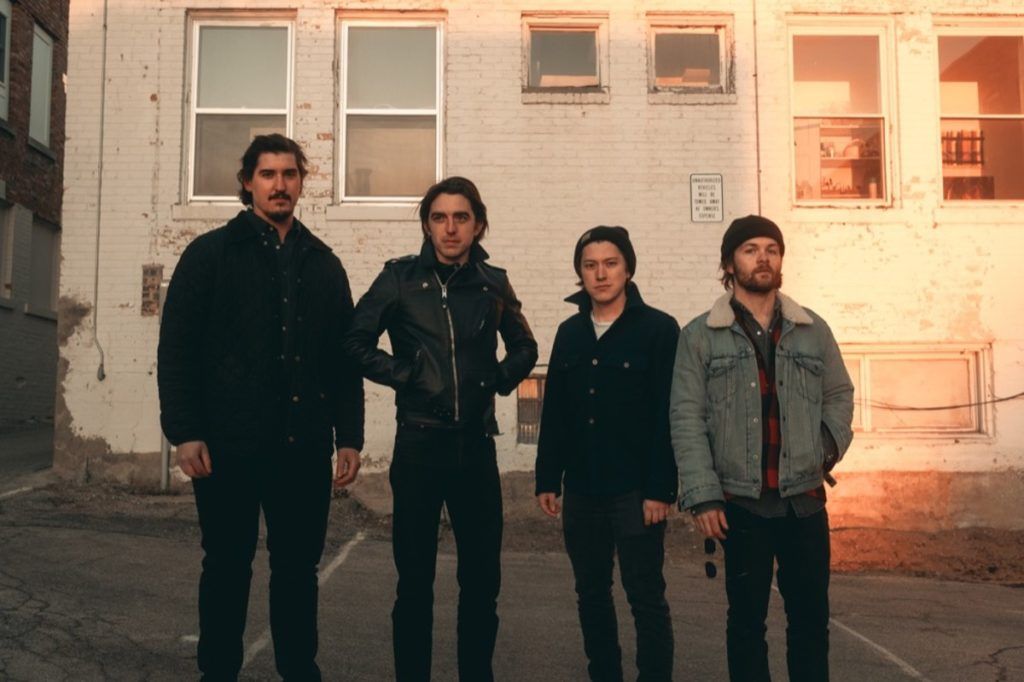
Lifelong friends and deep-north natives, musical group Michigan Rattlers play heavy-hearted folk-rock with an aching dose of Midwestern nice. Graham Young (guitar), Adam Reed (upright bass), Christian Wilder (piano), and Tony Audia (drums) began writing music and performing together in their Northern Michigan high school. They regularly played every bar, cafe, and stage in town, developing a musical chemistry informed by the likes of AC/DC, Creedence Clearwater Revival, Bob Seger, and more. After a few years apart, Reed and Young settled down in Los Angeles, recorded a short demo, and began playing locally. The demo found its way into the hands of super-producer Johnny K (Plain White T’s, 3 Doors Down), and they cut the bulk of their first EP at NRG Studios in just one day.This self-titled Michigan Rattlers EP attracted glowing reviews from No Depression, Bluegrass Situation, B3 Science, and Rolling Stone, who named the band one of their “Ten New Country Artists You Need To Know” in 2016. In 2018, following a massive summer tour that included stops at Bonnaroo, Firefly and Electric Forest; the band released their highly anticipated debut full length album, ‘Evergreen,’ on September 28th. “This is a band with solid songwriting chops and instrumental skills,” says No Depression. “‘Evergreen’ shows this three-piece from Petoskey, Michigan making a stand, making their way.”Links: Website | Facebook | Twitter | Apple Music | Soundcloud | Spotify

